How to Handle a Positive Drug Test with a Prescription
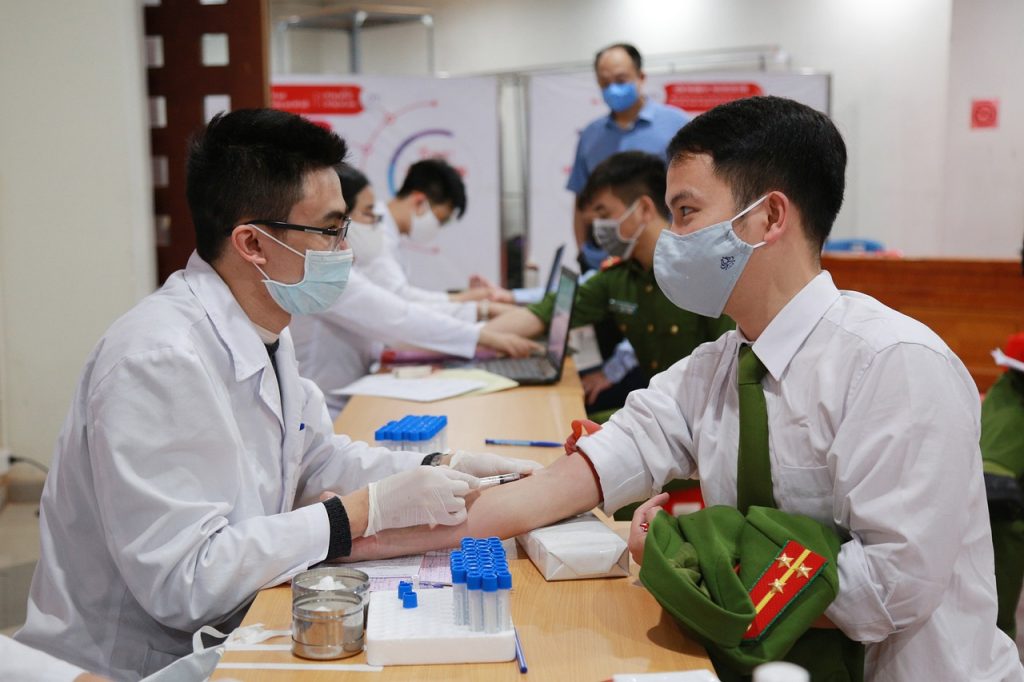
Understanding Drug Testing and Prescription Medications
Drug testing is a critical component of many workplace policies and procedures, ensuring safety, productivity, and compliance with legal regulations. However, the intersection of drug testing and prescription medications often leads to confusion. For individuals undergoing drug tests, understanding how these tests work and why prescription medications might lead to positive results is essential.
The Purpose of Drug Testing
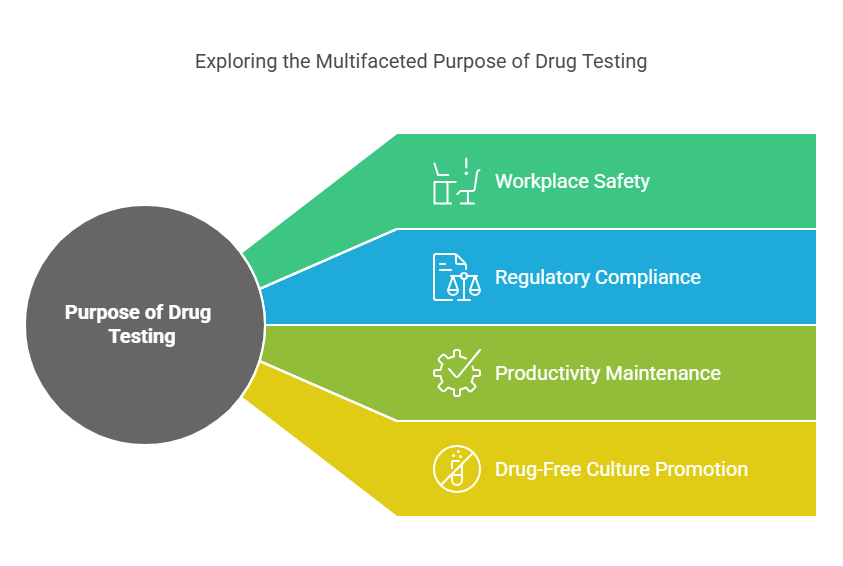
Drug tests are commonly conducted in various settings, such as pre-employment screenings, workplace testing, sports organizations, and legal or medical evaluations. Employers often implement drug testing programs to:
- Ensure workplace safety, especially in industries like transportation, healthcare, and manufacturing.
- Comply with federal and state regulations, such as those mandated by the Department of Transportation (DOT).
- Maintain productivity and minimize absenteeism.
- Promote a drug-free workplace culture.
For job seekers, drug testing is often a standard part of the hiring process. It’s important to note that testing positive on a drug test doesn’t always mean illegal drug use—it could be the result of a legitimate prescription.
How Drug Tests Work
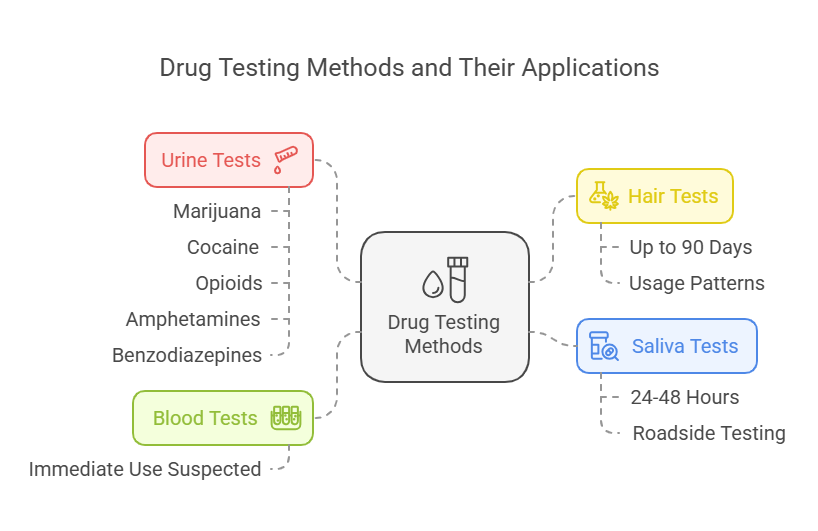
Drug tests are designed to detect specific substances or their metabolites in the body. Commonly used testing methods include:
- Urine Tests
- The most common method for detecting drugs.
- Screens for substances such as marijuana, cocaine, opioids, amphetamines, and benzodiazepines.
- Provides a window of detection ranging from a few days to a few weeks, depending on the substance.
- Blood Tests
- Measures the active presence of drugs in the bloodstream.
- Used when immediate drug use is suspected.
- Hair Tests
- Can detect drug use over a longer period, typically up to 90 days.
- Useful for identifying patterns of drug use rather than recent activity.
- Saliva Tests
- Detects recent drug use, typically within the last 24–48 hours.
- Common in roadside or on-site testing.
These tests target specific drug classes, but their sensitivity can result in “false positives” when prescription medications mimic the chemical structure of illicit substances.
Common Substances Screened in Drug Tests
Drug tests typically screen for the following substances:
| Drug Class | Examples |
|---|---|
| Marijuana | THC |
| Cocaine | Cocaine metabolites |
| Opiates | Codeine, Morphine |
| Amphetamines | Adderall, Methamphetamine |
| Benzodiazepines | Xanax, Valium |
| Barbiturates | Phenobarbital |
| Alcohol | Ethanol |
Prescription medications, such as painkillers, ADHD medications, and anti-anxiety drugs, can trigger positive results in certain drug classes.
How Prescription Medications Affect Drug Test Results
Prescription medications contain active ingredients that can sometimes resemble illegal substances in chemical structure or metabolic byproducts. For example:
- Opioid medications like hydrocodone or oxycodone may trigger a positive result in the opiates category.
- ADHD medications containing amphetamines, such as Adderall or Ritalin, may show up as amphetamines in a test.
- Benzodiazepines prescribed for anxiety or insomnia can lead to a positive result in the benzodiazepine category.
It’s important to recognize that these results don’t automatically equate to drug misuse. Proper documentation and communication can clarify legitimate use.
Prescription Medications and False Positives
False positives occur when a drug test identifies a substance that isn’t present, typically due to cross-reactivity with certain medications or supplements. Some common culprits include:
- Decongestants (e.g., pseudoephedrine) potentially showing up as amphetamines.
- Antidepressants (e.g., bupropion) mimicking amphetamine metabolites.
- Proton pump inhibitors (e.g., omeprazole) occasionally causing false positives for THC.
When undergoing a drug test, individuals should always disclose any prescription or over-the-counter medications they are taking to prevent misinterpretation of results.
Steps to Take If You Receive a Positive Drug Test Result
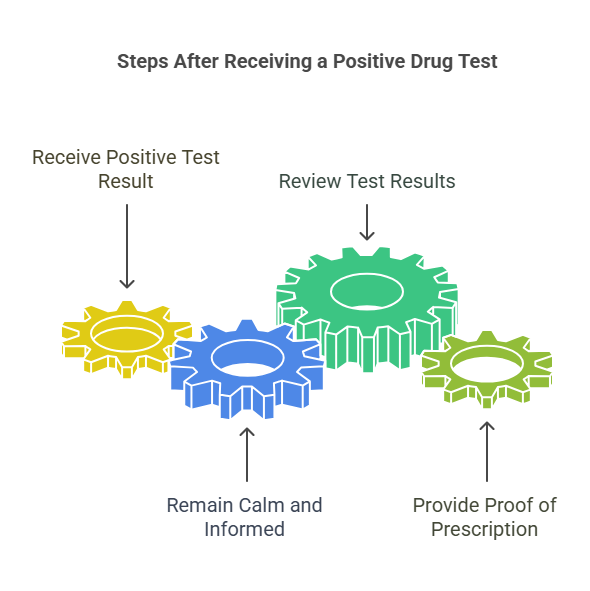
Testing positive on a drug test due to prescription medication is not uncommon. Here’s a step-by-step guide to address the situation effectively:
1. Remain Calm and Informed
Receiving a positive test result might be surprising, but remember that you have rights and options. Employers are generally aware that some medications can lead to a positive drug test and are required to follow proper protocols before making decisions based on the results.
2. Review the Test Results
After being notified of the positive result, request detailed information about the drug class or substance flagged. Understanding what was detected will help you identify whether it aligns with your prescription medication.
3. Provide Proof of Prescription
Gather documentation to verify your legitimate use of the medication. This typically includes:
- A copy of the prescription provided by your healthcare provider.
- A letter from your doctor confirming the prescribed medication and its purpose.
- A copy of the pharmacy label or receipt showing your name, the medication, and the prescribing doctor.
Most employers will allow you to submit this documentation as part of their review process.
The Role of Medical Review Officers (MROs)
Medical Review Officers (MROs) play a crucial role in reviewing positive drug test results. An MRO is a licensed physician trained to evaluate drug test results and consider medical explanations for positive findings.
What an MRO Does:
- Contacts the individual to discuss the positive test result.
- Reviews documentation, such as a valid prescription, to determine whether the result is medically justified.
- Updates the employer on the findings, clarifying whether the positive result was due to legitimate prescription use.
Employers rely on MROs to ensure compliance with legal standards and avoid discrimination against employees taking lawful medications.
Understanding Employer Policies
Employers must strike a balance between maintaining workplace safety and respecting employee rights. Here’s what you need to know about employer policies:
1. Drug-Free Workplace Policies
Many organizations implement drug-free workplace policies that outline acceptable and unacceptable drug use. Prescription medication may be permitted if disclosed and used according to medical guidelines.
2. Reasonable Accommodation
Under laws like the Americans with Disabilities Act (ADA), employers are required to provide reasonable accommodation to employees with medical conditions. If your prescription medication is part of a treatment plan for a medical condition, you may be entitled to accommodations as long as it doesn’t compromise safety or job performance.
3. Safety-Sensitive Roles
For jobs considered “safety-sensitive,” such as operating heavy machinery or driving, employers may impose stricter standards. If your prescription medication impacts your ability to perform safely, additional steps may be required, such as alternative assignments or adjustments to your role.
How to Communicate with Your Employer
Open and honest communication with your employer is critical if you test positive due to a prescription. Here’s how to approach the conversation:
- Notify Your Employer in Advance (If Possible)
- If you know your medication might trigger a positive result, disclose it before taking the test. Employers appreciate transparency, and pre-disclosure can prevent misunderstandings.
- Be Prepared with Documentation
- Have your prescription and any supporting documentation readily available. Provide this information directly to the MRO or the employer’s designated representative.
- Explain the Situation Clearly
- Avoid overly technical explanations. Simply state that you are taking a legally prescribed medication, provide proof, and explain its medical necessity if required.
- Understand Your Rights
- If you feel your employer is treating you unfairly or violating your rights, consult legal resources or advocacy groups to better understand your options.
The Role of Precise Hire in Employment Screening
At Precise Hire, we specialize in employment screening services that ensure both compliance and accuracy. Our processes are designed to protect employers and employees by adhering to fair and transparent practices.
How Precise Hire Supports Employers and Employees:
- Accurate Testing: We partner with certified laboratories and MROs to provide reliable test results.
- Comprehensive Reviews: Our MROs ensure every positive result is carefully reviewed to account for legitimate prescription use.
- Customized Solutions: We help employers design drug testing policies tailored to their industry, balancing safety and employee rights.
- Legal Compliance: Our team stays up to date with state and federal regulations to ensure our clients’ drug testing programs are fully compliant.
By partnering with Precise Hire, employers can confidently implement drug testing programs that prioritize fairness, transparency, and safety.
Employer Concerns and Employee Rights
Addressing Employer Concerns
Employers often worry about how prescription medications might affect workplace safety or performance. These concerns can be addressed through:
- Clear Policies: Employers should create policies that distinguish between illegal drug use and valid prescriptions.
- Confidentiality: Employers must maintain the confidentiality of medical information to comply with privacy laws like HIPAA.
- MRO Reviews: Ensuring all drug tests go through MRO reviews to eliminate bias or incorrect interpretations.
Understanding Employee Rights
Employees also have rights when it comes to drug testing and prescription medication use. These include:
- Protection Against Discrimination: Employers cannot discriminate against employees taking lawful medications for a medical condition.
- Right to Provide Proof: Employees must be given the opportunity to explain and validate positive drug test results.
- Confidentiality: Employers must safeguard sensitive medical information to protect employee privacy.
Key Takeaways for Employees
If you test positive for a drug test but have a prescription:
- Don’t panic—review the results and gather your documentation.
- Work with the MRO to clarify the legitimate use of your medication.
- Communicate openly with your employer while understanding your rights.
Legal Aspects of Drug Testing and Prescription Medications
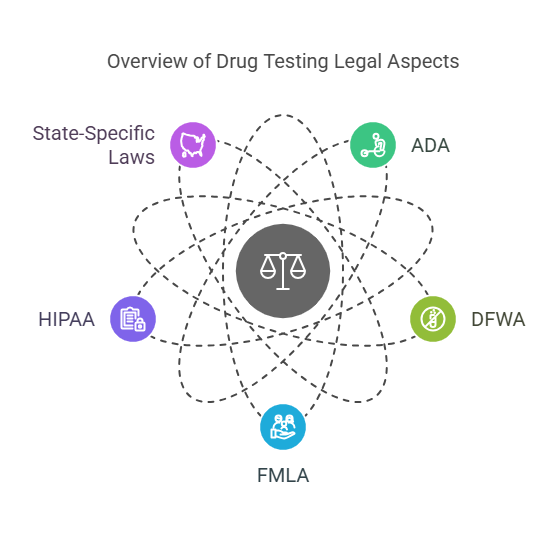
Drug testing laws vary by country, state, and industry, but certain overarching regulations protect the rights of individuals taking prescription medications. Here’s a closer look at the legal aspects you need to know:
1. Americans with Disabilities Act (ADA)
The ADA protects employees and job applicants with disabilities, ensuring they aren’t discriminated against due to their medical condition or necessary treatments, including prescription medications.
- Reasonable Accommodations: Employers must provide reasonable accommodations for employees with disabilities, provided it doesn’t impose undue hardship on the organization.
- Prohibited Discrimination: An employer cannot take adverse action based on a positive drug test result stemming from a legally prescribed medication for a documented disability.
2. Drug-Free Workplace Act (DFWA)
The DFWA requires certain federal contractors and grantees to maintain drug-free workplaces. While it mandates drug testing, it does not override protections for employees with valid prescriptions.
3. Family and Medical Leave Act (FMLA)
The FMLA allows employees to take unpaid leave for medical conditions requiring treatment, including those involving prescription medications. Employers must not penalize employees who test positive due to prescribed treatments related to their FMLA-protected condition.
4. Health Insurance Portability and Accountability Act (HIPAA)
HIPAA safeguards the confidentiality of medical information, including drug test results and prescription details. Employers must handle such information securely and only share it with authorized personnel.
5. State-Specific Laws
Some states have additional laws governing drug testing, including rules on how positive results must be handled. For example:
- Certain states require employers to give employees an opportunity to explain or challenge drug test results.
- States like California and New York have laws prohibiting discrimination based on legal off-duty use of prescribed medications.
Frequently Asked Questions (FAQs)
Can I be fired for testing positive if I have a prescription?
No, you cannot be fired solely for testing positive if the result is due to a valid prescription. Employers are required to allow you to provide documentation of your prescription, and termination based on such a result may violate the ADA or other laws.
What happens if I don’t disclose my prescription before the drug test?
While it’s generally advisable to disclose medications that might trigger a positive result, failure to do so doesn’t automatically lead to disciplinary action. You’ll still have an opportunity to present documentation after the test.
Can my employer share my drug test results?
Under HIPAA and other privacy laws, employers must keep drug test results and related medical information confidential. Sharing this information without authorization is a violation of privacy laws.
How does an MRO decide if my prescription is valid?
An MRO verifies the legitimacy of your prescription by reviewing documents, such as pharmacy records or a doctor’s letter. They ensure the medication was prescribed by a licensed healthcare provider and taken as directed.
What can Precise Hire do to help my employer handle drug testing fairly?
Precise Hire helps employers establish compliant and transparent drug testing processes. By collaborating with certified labs and trained MROs, we ensure accurate results and fair evaluations of positive tests due to prescription medications.
Can I be fired for testing positive if I have a prescription?
No, you cannot be fired solely for testing positive if the result is due to a valid prescription. Employers are required to allow you to provide documentation of your prescription, and termination based on such a result may violate the ADA or other laws.
What happens if I don’t disclose my prescription before the drug test?
While it’s generally advisable to disclose medications that might trigger a positive result, failure to do so doesn’t automatically lead to disciplinary action. You’ll still have an opportunity to present documentation after the test.
Can my employer share my drug test results?
Under HIPAA and other privacy laws, employers must keep drug test results and related medical information confidential. Sharing this information without authorization is a violation of privacy laws.
How does an MRO decide if my prescription is valid?
An MRO verifies the legitimacy of your prescription by reviewing documents, such as pharmacy records or a doctor’s letter. They ensure the medication was prescribed by a licensed healthcare provider and taken as directed.
What can Precise Hire do to help my employer handle drug testing fairly?
Precise Hire helps employers establish compliant and transparent drug testing processes. By collaborating with certified labs and trained MROs, we ensure accurate results and fair evaluations of positive tests due to prescription medications.
Conclusion: Navigating Drug Testing with Confidence
Drug testing is an essential part of maintaining safety and compliance in workplaces, but it’s critical to handle the process with fairness and respect for individual rights. Employees taking prescribed medications should not fear discrimination or wrongful termination due to positive test results, provided they follow the proper steps:
- Understand Your Rights: Laws like the ADA and HIPAA protect individuals taking prescribed medications from unfair treatment.
- Communicate Proactively: Disclosing relevant prescriptions before or after a drug test can help prevent misunderstandings.
- Provide Documentation: Present proof of your prescription to the employer or MRO when requested.
Employers, on the other hand, must ensure their drug testing programs are compliant with legal standards and designed to fairly evaluate results. Partnering with a trusted employment screening provider like Precise Hire can help organizations achieve these goals.
How Precise Hire Can Help
At Precise Hire, we pride ourselves on providing accurate and compliant employment screening services. Our solutions include:
- Partnering with certified labs to ensure reliable drug test results.
- Employing MROs to fairly review and verify test outcomes.
- Helping employers create drug testing policies that balance safety and employee rights.
By leveraging our expertise, employers can foster a safe, fair, and inclusive workplace while meeting their compliance obligations.
Final Thoughts
Testing positive for a drug test while using prescribed medication doesn’t have to be a roadblock. With the right steps and support, individuals can navigate the process confidently, ensuring their rights are protected and misunderstandings are avoided.
At Precise Hire, we’re committed to helping employers and employees navigate the complexities of drug testing with fairness and transparency. Whether you’re an employer looking to improve your screening processes or an employee seeking clarity, our team is here to guide you every step of the way.
